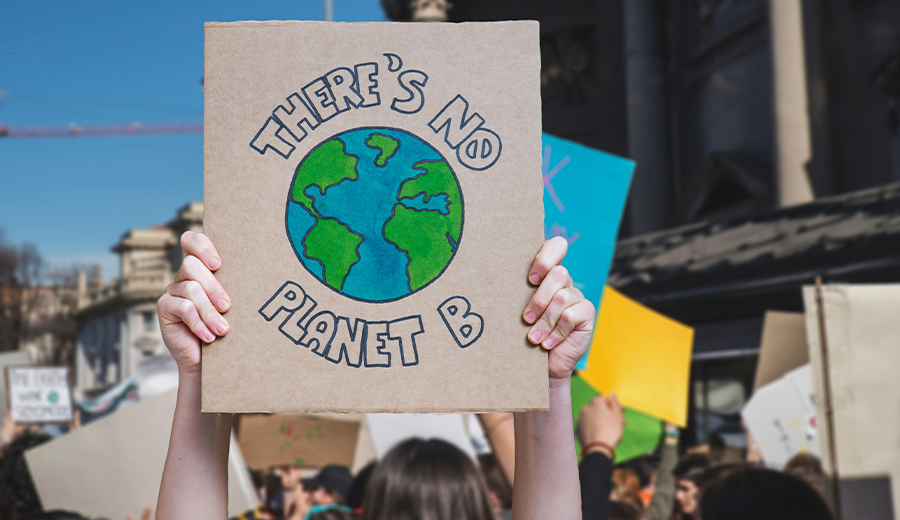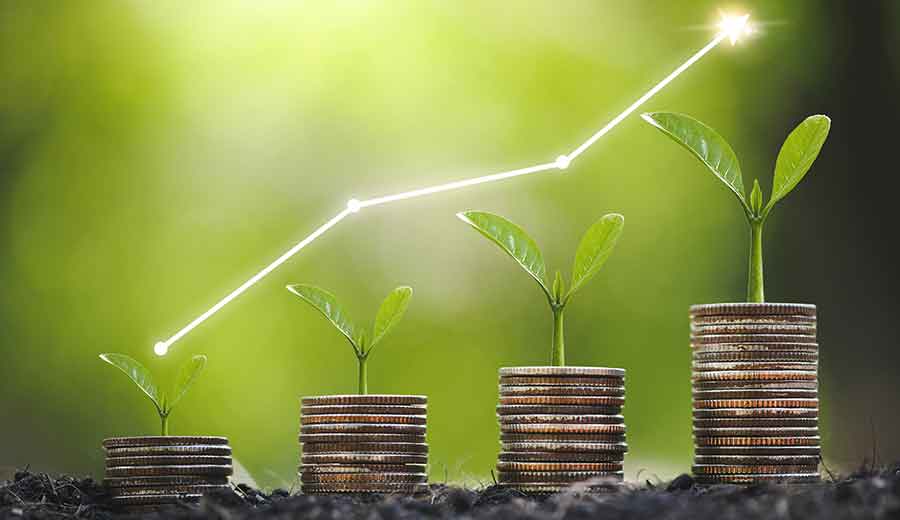
Climate Change – No Problem. We Must Act Now!
Climate change is inevitable. Reason enough for entrepreneurs and managers to think about sustainable solutions in all areas:
What is the role of executives in implementing sustainable transformation?
Can renewable energy sources fully meet our overall needs?
How can we identify and counter “greenwashing”?
How can we increase the resilience of our agriculture systems to deal with diminishing natural resources and food price volatility?
One of our hot topics at the Global Female Leaders Summit 2023 is climate change. We are pleased to give you a sneak preview of this exciting block of topics.
From Limits to Growth to Earth4All - Systems Solutions for the Planetary Emergency?
Spotlight: 24.04.2023
Instead of continuing to live in old patterns where power imbalances, relentless profit orientation, and a culture steeped in patriarchy are causing the global economic system to crumble, Dixson-Declève sees an urgent need to invest in the people, the planet and prosperity.
Left unchecked, rising income inequality, growing poverty and the lack of gender equity in the next 50 years will lead to increasingly dysfunctional societies, making co-operation to deal with existential threats like climate change more difficult. These are the conclusions of my new collaborative book, Earth for All: A Survival Guide for Humanity. However, the world can still stabilise global temperatures below 2°C and approach an end to poverty by 2050 by enacting five ‘extraordinary turnarounds’ that break with current trends and bring forward an optimised systems approach to achieving well-being and operating within planetary boundaries by around 2050.
Our economic and financial systems are broken, and we are reaching dangerous levels of inequality.
In the next 50 years, the current economic system will drive up social tensions and drive down wellbeing. We can already see how inequality is destabilising people and the planet and the current poly-crisis has only intensified the disparity between the haves and have nots. Yet not building resilience across our current economic and financial systems is a recipe for disaster. Citizens across the globe recognise we need a new paradigm. And the investment needed for this shift is small, just 2-4% of GDP annually with a focus on 5 key turnarounds: Poverty, Inequality, Empowerment, Energy and Food. 2-4% is less than our current annual subsidies to fossil fuel industries. This is easily affordable, and it will create millions of jobs. What is missing is coalitions of politicians willing to make it happen.
Ultimately, we need to think about building societies that value prosperity for all rather than profit for the few on a finite planet fit for the 21st century. Let’s be clear, a more equal society benefits everyone, even the very rich and this entails a focus on “Systems Change Not Climate Change” and “People Not Profit”. It means developing a new economic paradigm that goes beyond the current “green growth” and “de-growth” models into a better understanding of 21st century economics that enhance well-being and the creation of an Earth for All.
Hot Topics need Cool Heads: The Future of Energy
Executive Panel Discussion: 24.04.2023
Are you curious about what the future holds for energy? A future that is GREEN, where fossil fuels are a thing of the past, and renewable energy sources reign supreme. A future where the demand for fossil fuels hits a roadblock and where the growth in the world‘s energy needs is met by the rise of renewables. We are well underway in creating this future.
Renewable energy sources, such as wind and solar, have made significant strides in recent years, with fossil fuel demand reaching a plateau. The world's growing energy needs will be met by the growth in renewables. as they offer not only affordability and environmental friendliness, but also security. Putin helped accelerate this trend by making the world understand how important local energy sources are for energy independence.
What is the key to unlocking this green energy future? The answer lies in a combination of factors: political will, scaling of existing technology, and capital investment.
Scaling up commercial technologies, such as solar, wind, battery storage, and efficiency improvements, should now be the world's top priority.
How much capital investment is required? The estimates for investment range, but most experts agree that an annual 2-3 trillion USD, representing only 2-3% of global GDP. The future of energy is green, and with the technology and capital available, there is no excuse not to make it happen.
We look forward to our panellists:
Magali Anderson | Chief Sustainability & Innovation Officer | HOLCIM | Switzerland
Erin Beilharz | Managing Director CleanTech Hub | Lufthansa Group | Germany
Doris Honold | Member Board of Directors | The Integrity Council for the Voluntary Carbon Market | UK
Kristin Myskja | Director General | Ministry of Petroleum and Energy | Norway
Moderated by Melinda Crane
HOLCIM, Switzerland
Lufthansa Group CleanTech Hub, Germany
The Integrity Council for the Voluntary Carbon Market, UK
Ministry of Petroleum and Energy, Norway
Climate Change Think Tank Academy
The one-hour Think Tank Academy is designed to establish up-close networking opportunities while discussing cutting-edge topics in an interactive and content-driven environment. Parallel sessions give participants the opportunity to select their topic of interest. This format enables in-depth and open discussions and exchange of insights and experience amongst senior leaders.
Choose your favorite topic:
1. How to use the ESG regulatory momentum for sustainable business transformation
The plethora of current and future reporting requirements, metrics and increased stakeholder expectations on sustainability can overwhelm companies and executives. Complexity has increased, companies are required by a new understanding to consider the interests of a broader stakeholder group and to address the impact of the company on its external environment in addition to the impact on its own business. It would be only natural if in this increasingly challenging situation companies would focus on only meeting sometimes very ambitious legal requirements. However, this would mean missing the unique push for transformation sustainability can offer. Sustainability can be a value driver for companies and can point the way to the future viability of a business model. Particularly in view of the current increase in legal regulation of a wide range of sustainability issues, it is essential for companies to reflect on the opportunities offered by sustainability. Join us in this workshop to shed light on how this can be achieved.
2. Journey and Experiences Towards Gender Equality – EQUAL-SALARY Global Certification
“LET'S TALK EQUAL PAY”
In their think tank "Let’s Talk Equal Pay", Noémie Storbeck and Petra Angstmann share their experiences with the EQUAL-SALARY global certification process and Petra reports candidly about the facts and figures, lessons learned and changes within the organisation.
Noémie Storbeck makes the case that getting certified by EQUAL-SALARY isn’t just the right thing to do, it is also good for business. It establishes a culture of trust and transparency, boosts employee loyalty, and it attracts a new generation of talent.
We wish to look ahead into the future with you in the think tank, what topics and certification processes will be on the agenda for Diversity, Equity & Inclusion in the next 5 years? Is the EQUAL-SALARY Certificate only the first step on the way to even more Diversity, Equity & Inclusion?
Changing the World – Bite by Bite with Planted Meat
Animal meat production is one of the largest instigators of the climate crisis; has been linked to a higher risk of various wide-spread diseases; and yet, meat plays a crucial role in our diet from a socio-cultural and physiological view point.
Current plant-based meat are not able to replace more than 2.5% of meat consumption, and therefore aren’t having the required impact on our food system. Consumers argue that this is due to: lack of taste, high price, and questionable ingredients. In order for meat-eaters to make these switches, we need to create ‘better meat than animals’ – better taste, price, environmental impact, efficiency and healthiness.
To achieve this, we need to invent new technologies, re-design value chains, update regulations, get more talent into the industry, allocate financial resources, re-shuffle subsidies… How do we accelerate the shift towards a more plant-based diet? What is the role of industry players, politics, retailers, consumers? And how do we deal with road blockers?
EQUAL-SALARY Foundation, Switzerland
Wintershall Dea AG, Germany
Taking Action – How Companies Can Act on Climate Change
Find your data. That’s the starting point of BABOR BEAUTY GROUP’s sustainability initiatives that reduce the company’s carbon footprint by 50 % until 2025. With an inhouse digital carbon dashboard that monitors emissions almost in real time, the German family company won awards, attracted the interest of tech giants and secured attractive ESG-linked loans to build a new production site. In this Think Tank sustainability Expert Wiebke Thünnesen explains how the company found its data, how it uses it and invites to a discussion beyond industry boarders: Which actions can we take? Is the obvious measure the most effective one? How can we set-up a team of experts to drive initiatives? How do we deal with our limitations?
Taking Action – How Companies Can Act on Climate Change
Find your data. That’s the starting point of BABOR BEAUTY GROUP’s sustainability initiatives that reduce the company’s carbon footprint by 50 % until 2025. With an inhouse digital carbon dashboard that monitors emissions almost in real time, the German family company won awards, attracted the interest of tech giants and secured attractive ESG-linked loans to build a new production site. In this Think Tank sustainability Expert Wiebke Thünnesen explains how the company found its data, how it uses it and invites to a discussion beyond industry boarders: Which actions can we take? Is the obvious measure the most effective one? How can we set-up a team of experts to drive initiatives? How do we deal with our limitations?
Planted Foods, Switzerland
BABOR BEAUTY GROUP, Germany
Sustainable Mobility: Next Moves?
People and goods have always moved in the history of mankind. Today, global trade is dependent on shipping, air transport and long-haul trucking. As the transport and logistics industry has been a key driver for global trade and socio-economic development across the globe, it also is a big contributor to climate change.
According to the International Energy Agency (IEA), transport - sea, air and road combined - represents the highest reliance on fossil fuels of any sector and accounted for 37% of GHG emissions from end‐use sectors in 2021, with trade related freight playing an important role. Transport may have been one of the sectors most affected by the Covid-19 pandemic, but 2022 saw it rebound.
A shift to zero emission vehicles is underway but the implications of a net zero - or more ambitiously a truly circular supply chain where we seek to reuse, recycle and reduce consumption of all natural resources - are wider. Transformative zero carbon technologies for air and sea are still many years away. Yet customers, consumers and civil society are demanding the transport and logistics sector to transition to a zero-carbon business model.
With most of the movements over international air space and international waters, technologies that can move long distances at a time and which can also support heavy loads and volumes, and which are resilient to extreme weather conditions are needed. This makes the transition to clean technologies in the transport and logistics industry particularly challenging. Nevertheless, there are many ways today to avoid and reduce C02 in transport and logistics.
Our panel of experts will discuss not only the challenges but the solutions and what actions need to happen.
Kühne & Nagel, Switzerland
Air France – KLM Group, France
KPMG, Germany
The Need for Transformation in the Fashion Industry on the example of C&A
One pen, one notepad. Armed with this simple set-up C&A’s CEO Giny Boer started her first weeks in the middle of the pandemic only seeing her new colleagues on the laptop screen. To listen and to learn. Learn how C&A works, what works well, what doesn't work at all.
This notepad filled with handwritten learnings turned into the "ONE C&A plan", Giny Boer's strategy to transform the over 180-year-old brick-and-mortar fashion house into a modern European omnichannel fashion brand. Focussing on more modern styles, digitalization, sustainability, and speaking about pro-actively and transparently.
Giny Boer tackles the challenge of bringing C&A back to growth with a new style of leadership. The first woman at the top at C&A leads with cooperation, kindness, and vulnerability. She emphasises to always keep it simple even in complex economical environments facing high pressure. Keeping it simple – like starting a huge task with just a pen and a notepad.
The Great Food Transformation: The Breakthroughs we Must Have to Secure a Liveable Future
The science is loud and clear: unless we get a fundamental transformation of food production and consumption underway during this decade around the world, there is no chance to avoid catastrophic climate disruption and nature loss, we will fail to reverse the spread of hunger and diet-related ill health, and the risk of new pandemics will continue to rise. Gunhild Stordalen will present the big shifts we need to get underway to secure a livable and safe future, and the breakthroughs that can drive those shifts—across policy, business practices, finance and consumer behavior, and the role that technology and innovation can play to accelerate positive change.
Social Entrepreneurship: Centering Social Impact
Growing inequalities are a global challenge. By centring social impact, social entrepreneurship has the potential to address disadvantage and empower people, families and communities. Through improved income opportunities and access to products and services essential for an inclusive and sustainable society, people, planet and business will benefit.
How can business be a force for positive impact and inclusivity?
How can corporates and social entrepreneurs’ partner and leverage shared expertise?
How can systems change improve livelihoods for people who are the most vulnerable?
Growing inequalities are a global challenge. And a global threat. Positive social impact is an essential ingredient in all our efforts to create a more sustainable future. People and planet can both benefit when we centre social impact in our decision making – whether as individuals, in business, or when we advocate and influence policy.
By centring social impact, social entrepreneurship has the potential to address disadvantage and empower people, families, and communities. Improved income opportunities and access to products and services essential for an inclusive and sustainable society help build resilience in the face of global challenges.
Established businesses can play an important role, diversifying their supply, integrating social impact measures, or supporting social entrepreneurs to scale solutions – be it through organisational development or more transformative interactions in society. Working together, corporates and social entrepreneurs can leverage and multiply shared knowledge, expertise and impact.
Join Åsa Skogström Feldt to hear how IKEA Social Entrepreneurship has developed their social impact agenda over the last ten years, supporting and working with social entrepreneurs and learning what it takes to be a force for positive impact and inclusivity. Jenifer Colpas, founder of the social enterprise, Tierra Grata in Columbia, will share the stage and provide perspective on how social interventions in energy, water and sanitation can transform communities from the ground up and how their approach is improving livelihoods for people in under-served communities.
Jenifer Colpas | Founder | Tierra Grata | Columbia
How can we develop solutions adapted to the most remote and vulnerable contexts to generate real transformations and boost community development?
From our experience working for more than 7 years in rural communities in Colombia, we will tell our lessons learned and success stories in our journey to develop people-centered solutions to solve social problems.
IKEA Social Entrepreneurship BV, Sweden
Tierra Grata, Colombia
How Climate Change can Stimulate Innovation
Spotlight: 24.04.2023
Is climate change a barrier or a stimulus to innovation? Teresa Rodó has a very clear point of view on this!
Teresa will share concrete examples - incepted within the function she is heading - showing how climate change can drive us to think differently, to find new solutions, and ultimately add value for our stakeholders. For her, a combination of science & technology and human factor are always part of the solution!
The successive crisis of the past years left us with a clear lesson: there is no going back to the world we knew. We shut the light dark on our old model based on cheap energy, cheap raw materials, and cheap labour. The challenges ahead are certainly big, but this is our chance to shape the world the way we want it to look. This means a digital transition that makes technology work for us all. And a deep transformation of our economies where competitiveness goes hand in hand with the preservation of our planet. By achieving these two goals, we will be able to recognise ourselves in the world we’ll help to build, as consumers, as citizens, as women.
Head of Global Healthcare Operations, Member of the Healthcare Executive Committee | Merck KGaA, Germany
Comments
No Comments





















